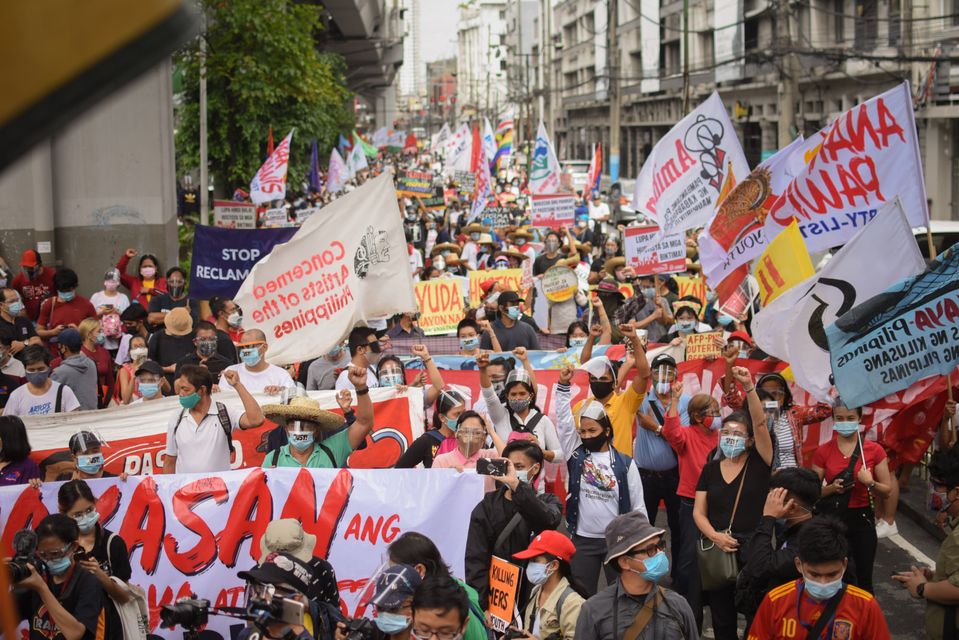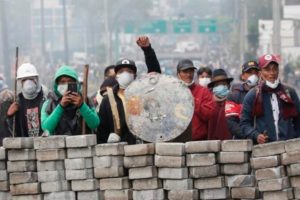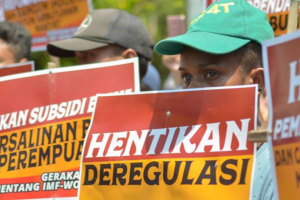Photos by Carlo Manalansan/Bulatlat
We denounce the Duterte government’s railroading of the legislative process for the Terror Law and its IRR, and join Filipinos and the international community in heightening the call to junk this repressive, unconstitutional law.
Multiple global crises and governments’ failure to address them have spurred protests all over the world despite COVID-19 pandemic restrictions. Despite people’s clamour for change, elite-led states continue to champion the neoliberal agenda for monopoly capitalist interests. States are desperate to maintain the status quo for corporate and elite interests, and are responding harshly and violently to resistance. Many have resorted to the implementation of laws to further limit people’s democratic participation and even criminalise their exercise of civil-political rights, as people demand for social and economic rights and sovereignty.
We, at IBON International, are indignant over governments’ refusal to heed people’s legitimate calls and their instrumentalisation of civil institutions and mechanisms, including the resort to “counterterrorism” legislation, to curtail people’s rights and resistance. We condemn states’ assault on people’s movements and civil society, and call on them to hold all perpetrators, including government officials, corporations, the police and the military, accountable. We enjoin international support and solidarity for movements and organisations working to reverse states’ fascist course today.
Counterterrorism legislation such as the Philippine Terror Law and its IRR aim to isolate the people’s movements that are pushing for comprehensive social changes by invalidating and criminalising their work and even their allies,such as the “terrorist” and red-tagged progressive sectors in the Philippines who are pushing for genuine agrarian reform, national industrialisation and sovereignty from monopoly capitalist interests.
In the Philippines, the Implementing Rules and Regulations (IRR) of the notorious 2020 Anti-Terrorism Act, released last 17 October, only serves to reinforce Duterte’s militarist regime through accelerating the clampdown on people’s rights. The “Terror Law” is widely opposed for its broad definition of terrorism, and for its criminalisation of “advocacy, protest, dissent, strike” and other mass actions that are deemed threatening by the state, and for its stringent and unconstitutional measures against such “terrorist acts” including warrantless arrests and extended detention.
Lawyers’ group National Union of Peoples’ Lawyers criticises the IRR for “expanding its scope and limitations, and adding new provisions and mechanisms that are not present in the law itself.” For instance, the IRR now includes “creative, artistic and cultural expressions” that “incite terror” among “terrorist acts”. The IRR also adds a mechanism, the submission of a sworn statement to the newly instituted Anti-Terror Council, that allows state forces to detain a suspect for a maximum of 24 days even without a case filed against her/him.
We denounce the Duterte government’s railroading of the legislative process for the Terror Law and its IRR, and join Filipinos and the international community in heightening the call to junk this repressive, unconstitutional law.
The terror law is not singular to the Philippines. According to the 2018 report of the International Centre for Not-for-Profit Law, at least 140 governments have adopted counterterrorism legislation since the US launched its “war on terror” in 2001.
We call on the Philippine Supreme Court to act on the petitions against the law filed by different sectors including peasant organisations, unions, Indigenous Peoples, Moros, lawyers, environmental defenders, women’s rights activists and development workers. Currently, there are 37 petitions pending against the law. The Council for People’s Development and Governance, a Philippine-based national platform of development CSOs hosted by IBON International, is among the petitioners. People’s organisations and civil society continue to assert their rights amid threats of the Terror Law and its IRR, such as in the recent peasant-led protest action in the historic Mendiola street in Manila.
The terror law is not singular to the Philippines. According to the 2018 report of the International Centre for Not-for-Profit Law, at least 140 governments have adopted counterterrorism legislation since the US launched its “war on terror” in 2001. These laws are proven to be directly correlated to the rapid shrinking of civic space, including violations of rights and blocking of people’s participation in democratic governance.
The Palestinian people, who are fighting the US-backed Israel apartheid state and asserting their right to return to their land, are deeply familiar with criminalisation and isolation of their just resistance through “terrorist” tagging.
In India, “anti-terrorism” laws target activists and organisations especially those criticising and opposing its discriminatory citizenship law, and have led to arrests and even to the freezing of assets and forced closure of advocacy group Amnesty International.[i] China’s imposed national security law in Hong Kong also criminalises dissent. In the United Kingdom, anti-arms and environmental groups, and the Palestinian Solidarity Campaign were among those tagged as terrorist organisations by the police. The Palestinian people, who are fighting the US-backed Israel apartheid state and asserting their right to return to their land, are deeply familiar with criminalisation and isolation of their just resistance through “terrorist” tagging.
Ultimately, counterterrorism legislation such as the Philippine Terror Law and its IRR aim to isolate the people’s movements that are pushing for comprehensive social changes by invalidating and criminalising their work and even their allies, such as the “terrorist” and red-tagged progressive sectors in the Philippines who are pushing for genuine agrarian reform, national industrialisation and sovereignty from monopoly capitalist interests.
We join peoples’ cries for long-overdue system change. We support people’s movements and civil society demanding for the overhaul of oppressive systems that have entrenched inequalities and of institutions that only serve elite interests and reinforce the status quo. The recent electoral victory of the Indigenous Peoples in Bolivia against US intervention affirms the power and decisive force of people’s movements to claim their rights and sovereignty and determine their development paths.
IBON International joins peoples’ cries for long-overdue system change. This call is especially urgent now that the COVID-19 pandemic and its impacts have laid bare the rottenness of the prevailing neoliberal system. We support people’s movements and civil society demanding for the overhaul of oppressive systems that have entrenched inequalities and of institutions that only serve elite interests and reinforce the status quo.
We are in solidarity with the people of Thailand protesting against their military-based constitution and against state attacks in relation to the Lèse Majesté or anti-Royal Insult; with Indonesian workers organising strikes to oppose the neoliberal Omnibus Law; with the Nigerian youth protesting against police brutality and inequality; and with the indomitable liberation struggles of peoples in Palestine, West Papua, among others. The recent electoral victory of the Indigenous Peoples in Bolivia against US intervention affirms the power and decisive force of people’s movements to claim their rights and sovereignty and determine their development paths.###
[i] https://www.aljazeera.com/news/2020/9/29/amnesty-says-its-halting-work-in-india-due-to-govt-witch-hunt



